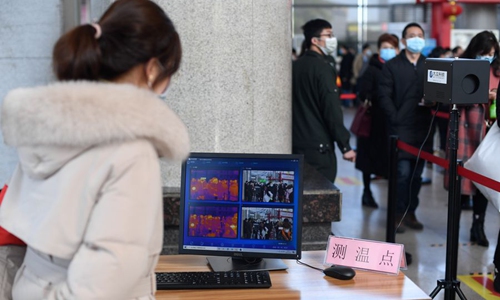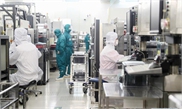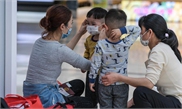Chinese workers’ basic needs push production resumption amid virus fight

Body temperature information of visitors is displayed on a monitor of an infrared temperature screening system in the Yiwu International Trade Market in Yiwu, east China's Zhejiang Province, Feb. 18, 2020. (Xinhua/Huang Zongzhi)
Starting this week, factories in some southern Chinese cities resumed production amid the novel coronavirus outbreak. Yiwu of Zhejiang Province, known for its small commodity trade and vibrant market, chartered transportation specifically to bring workers back to the city and also provided them with allowances. Hangzhou, provincial capital city of Zhejiang, arranged special trains for workers from Sichuan, some 1,000 kilometers away, so they could return to work in Hangzhou.
These southern Chinese cities are key manufacturing bases for export products. The resumption of work in these places is the embodiment of the changing relations between China and the world. Observing and analyzing the Chinese economy must be based on these factories, their workers and their families.
The epidemic that broke out in Wuhan has forced the world to examine the relationship between the world's economy and the Chinese economy. As China has become the main engine of world economic growth, the severe challenge brought about by the epidemic has been a heavy blow to the global economy. The latest prediction by Standard Chartered bank shows that when the growth of the Chinese economy dips to 5.8 percent, the world economy will plummet by a tenth of a percentage point, which would result in the loss of tens of billions of dollars.
The epidemic has led some factories to suspend production. It is estimated that the number of iPhones produced in the first quarter of this year will decline 10 percent, or about 36 to 40 million handsets. The BBC reported that due to the suspension of work, Chinese factories will not be able to provide export components and the South Korean company Hyundai, the world's fifth largest carmaker, has been forced to halt production in South Korea, after it ran out of parts from China. BMW and Volkswagen have also suspended production in China. Meanwhile, China's neighbors, which themselves have become important manufacturing bases, have been profoundly impacted.
However, it is Chinese workers - who have labored in factories for decades - who have been most deeply impacted by the epidemic. For more than 40 years, since the beginning of China's reform and opening-up, these people's hard work has contributed to China's accomplishments and made China the world's factory. The trade network that now connects every corner of the world to Yiwu and other Chinese manufacturing centers, shows China's central role in the world. This network brings China and the world closer together.
The survival of the factories along China's coast will determine if many companies around the world can continue to operate normally, and whether ordinary people in many countries can continue to live the low-cost, high-quality life they have become accustomed to. Likewise, the shutdown of China's manufacturing affects tens of thousands of Chinese families. They need work and income so their children can receive a good education and their families can live a stable life. The epidemic is still severe, but they have no other choice but to return to work.
To understand today's China, people need to first understand these Chinese workers who are returning to their factory jobs during the epidemic. To understand how the epidemic will affect China's economy, people should understand what these workers are thinking.
Chinese workers might find it difficult to relate to GDP growth rates, but they know very well how much gets deposited in their bank account, what kind of university their children can attend, the quality of medical care their families receive and the retirement nest egg they can build.
More importantly, China's reform and opening-up has created opportunities for individuals and families to build wealth, giving them hope for a moderately prosperous life. This is the basic driving force behind China's economic rise. The impetus for restoring production during the on-going epidemic comes from the basic needs of these ordinary people.
The author is a senior editor with People's Daily, and currently a senior fellow with the Chongyang Institute for Financial Studies at Renmin University of China. dinggang@globaltimes.com.cn. Follow him on Twitter @dinggangchina



